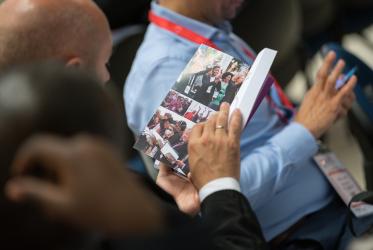We were welcomed to this land in song, scripture, and ceremony by the Sami people and members of the Ecumenical Indigenous Peoples Network. We acknowledge the Sami of Norway, Sweden, Finland and parts of Russia and the Inuit of Greenland as Indigenous peoples of Europe. As people from the world’s four directions, representing 40 different Indigenous communities, we celebrated our time together in prayer, conversation, and reflection on our theme: Restoring wholeness in Creation for reconciliation and unity.
As people belonging to rich traditions of prudence, and as people pushed to the margins, we seek to make visible what is hidden by and from the view of those who occupy the centers of the world.
Reconciliation
Our common understanding of the interdependent and interconnected reality and dynamics of life compels us to assert that reconciliation that does not include the whole of God’s creation is incomplete and superficial. A holistic consciousness of life kindles and nurtures mutual respect and responsibility, enables one to be humble, just and compassionate. Seeking reconciliation is a spiritual and moral choice. It involves restoring justice, truth-telling, repentance and forgiveness. It is an ongoing journey that unveils God’s presence and purposes in all of God’s creation. It is not an easy journey, but one that calls for costly discipleship (Matt 19.21; Mark 8:34-35, Luke 9:23).
Hierarchies and power-based relationships, whether in the church or the wider society obstruct such goals. Reconciliation involves courage to dismantle oppressive structures, policies, and theologies that restrict access to the abundant life that Jesus promised for all. (John 10:10).
Unity
We reiterate that the dominant discourse on reconciliation and unity has largely been responsible for the domination and suppression of Indigenous communities, and other marginalized communities. Christian unity, in an Indigenous context, has often meant little more than conformity to the colonial way of life, and the dissolution of Indigenous, land-centered identity. We remind the Church of unity as it is illustrated on the day of Pentecost, not by all of God’s children speaking the same language, but of each person being understood and honored in their own mother-tongue.
Christ’s Love
Love, as taught by Jesus of Nazareth, is radical. It heals and restores, and confronts and transforms. It calls us to love our enemies, restore justice, and make community with those pushed to the margins by the dominant systems and traditions. It indicts systems and cultures that discriminate and dehumanize. It empowers the disempowered and re-members the dis-membered. As such, Christ’s love is subversive and offensive to the systems and cultures that dominate, discriminate and dehumanize. Such love alone can make reconciliation lasting and unity real.
Indigenous spirituality
In contrast to some dominant religious traditions and belief systems that continue to legitimize injustice and the abuse of human beings and the earth with their truncated views of life, anthropocentric theologies and hierarchical institutions and relationships, we hold forth Indigenous spiritual traditions as life-nurturing practices. These are shaped by an awareness of life in all its diversity, vastness and interconnectedness. These call us to re-anchor our understanding of and our relationship with God in the affirmation of God as the Creator of life. Vast, diverse and beautiful, the creation, in all its intricate interconnectedness and interdependence is God’s self-expression and God’s wisdom and generosity.
Indigenous peoples have God-given identities that are beautiful. God was present in our lands and among our peoples before the colonizers arrived. When Christians brought the Bible to us we recognized the voice of our Creator in Jesus’ teachings. But we did not hear a call to reject our identities. We heard God loves us. God loves our cultures and our languages and our spiritualities. God knows us and God loves us as spiritual beings in relationship with each other and with all of Creation. Our cultures are libraries of ancestral memory. Our languages which uphold our sacred relationship with our lands are storehouses of ecological well-being.
And yet the colonizers and their churches told us, “It’s not a coincidence but God’s will that they will die out,” as said by a non-Sami priest. We have been subjected to genocides around the world; some have been spoken about, while others have been suppressed. In many contexts, the church has been complicit in these genocides. We have been victims of spiritual violence perpetrated by Christian churches since first contact. This prompts us to decolonize our faith traditions in order to rediscover the life-nurturing and rehumanizing potential of the gospel.
As Indigenous Christians, we claim our power, agency, and authority to self-determine in spiritual matters. This is consistent with the United Nations Declaration on the Rights of Indigenous Peoples. Indigenous theologians, Indigenous clergy, and the people of Indigenous churches have the capacity to formulate Christian theologies that have relevance, authenticity, and integrity.
Our openness enables us to hold together our worldviews and Christian faith traditions in harmony. For Indigenous Christians, there is a fluidity, a porosity, of the Spirit of Indigenous and Christian worldviews; one cannot work without the other. Accusations of syncretism are not only unhelpful, but also abusive.
There can be no reconciliation without understanding the truth of the spiritual violence we have experienced and without considerable work at healing. We are on our own healing journeys to recover our God-given identities. Everywhere in the world it is difficult and in some parts of the world it is nearly impossible. Healing from historical trauma is intergenerational. Our mental and physical well-being, that of our children, grandchildren, and generations to come are at stake. And this healing is directly tied to the healing and well-being of our lands, our waters, and the air we breathe.
Political Engagement
We are particularly concerned about the increasing nexus among neo-liberal economics, rightwing politics, and authoritarian regimes and their new mechanisms to silence and suppress dissent and aspirations for justice and rights of the marginalized communities in many parts of the world. As such our affirmations of love, reconciliation, and unity must involve critical engagement with these global and local dispensers of injustices, even if such actions threaten the positions of power and privilege of some of us.
Indigenous Land Rights and Climate Change
Reconciliation is not only about restoring broken human relationships but also humanity’s broken relationship with the creation. God’s love is not limited to the human world and life has no future without seeking reconciliation with the earth. We are the people of the earth and we call all to find our common earth identity.
As we have said, land is sacred to Indigenous peoples. It gives us identity and livelihood. Yet our way of being has been under attack for generations. Even new Green and Blue solutions, intended to provide alternative pathways, have led to suffering in our communities. The restoration of the wholeness of creation, therefore, will require a reimagining and deconstructing of the dominant worldview and theology. We recognize that the majority of Indigenous peoples are the most marginalized communities in many parts of the world, exposed to poverty, disease, malnutrition, dispossession, exploitation, trafficking, forced migration or denied possibilities of migration or asylum. It is imperative for the church not only to accompany them but also to advocate for justice on their behalf.
As we join the larger efforts to address climate change with our distinct experiences of suffering, we call on the churches in the North to impress upon their governments to halt or restrain extractive and exploitative projects for economic growth and prosperity on the land.
Our conversation on the restoration of creation as necessary for reconciliation and unity opens possibilities to offer new content to churches’ advocacy for Climate Justice.
In conclusion, we want to assert that our commitment to the restoration of the creation is inclusive of the restoration of all those yearning for justice, dignity and freedom and struggling against exclusionary ideologies, systems and cultures. To that extent, we see ourselves as proclaimers of new paradigms for the celebration of life and as partners with God in the mission of transformation that ensures space and dignity for all of God’s creation. We affirm our faith in God who announces, “Behold I create new heavens in which life, justice and peace are possible for all”. (Isaiah 65:17-35)
Recommendations
1. We call upon the World Council of Churches to ensure that the Indigenous Peoples programme has its own fully financed desk with adequate resources.
2. We call upon the World Council of Churches to pursue its Climate Justice initiatives through the Indigenous Peoples desk.
3. We call upon the World Council of Churches and its member churches to initiate mechanisms to address Indigenous peoples’ need for healing from historical and intergenerational trauma.
4. We call upon the World Council of Churches and its member churches to encourage the establishment of Truth and Reconciliation processes that are based on restoring justice and healing relationships wherever genocides have occurred.
5. We call upon the World Council of Churches to commit to advocate for the aspirations of Indigenous communities, such as those in West Papua, Maohi Nui, Kanaky and other places who struggle for self-determination and continue to be threatened by projects such as Green and Blue colonization.
6. We call upon the World Council of Churches to promote education about Indigenous peoples’ theologies and worldviews, including as part of their efforts to address climate change.
7. We commend the World Council of Churches for repudiating the Doctrine of Discovery and Terra Nullius and encourage its member churches, who have not already done so, also to repudiate these concepts.





